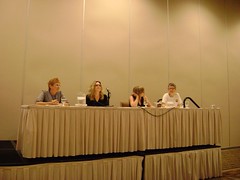 In the one of the last session slots of the ALA Conference was a gem of a program geared toward smallish public libraries who have either no IT Department or a very small one. Diane Neal, North Carolina Central University, Brenda Hough, MaintainIT Project and Jennifer Lee Peterson, WebJunction were the panelists for the presentation. The session went from specific things that librarians can do to keep their technology running to a broader look at what resources are out there for troubleshooting specific issues, finding “best practices” and using free tools to plan and maintain your technology at a higher (library-wide, as opposed to a single machine) level.
In the one of the last session slots of the ALA Conference was a gem of a program geared toward smallish public libraries who have either no IT Department or a very small one. Diane Neal, North Carolina Central University, Brenda Hough, MaintainIT Project and Jennifer Lee Peterson, WebJunction were the panelists for the presentation. The session went from specific things that librarians can do to keep their technology running to a broader look at what resources are out there for troubleshooting specific issues, finding “best practices” and using free tools to plan and maintain your technology at a higher (library-wide, as opposed to a single machine) level.
It started off with Diane giving a very nuts-and-bolts presentation about basic PC, printer and network troubleshooting. She went through the basic troubleshooting steps for your PC (reboot, check cables, discover “where it hurts” on the machine…) and then did the same for printers and network issues. She gave concrete steps to use when troubleshooting, but also gave pointers for talking to the next level of tech support and what they will need from the end users. It was all incredibly useful stuff!
Brenda started off with an introduction to the MaintainIT project. For those who are unaware of it, this project takes challenges and successes from librarians across the country and makes them into stories and recipes that other libraries can use. They issue free Cookbooks that provide solid technical advice, ideas and help so that other libraries don’t have to reinvent the wheel to get around their challenges. They have also begun creating webinars, in conjunction with Webjunction, that deal with specific challenges in a short, 30 minute, format, as well as a book club that gives librarians a chance to discuss the individual chapters of the cookbooks. After she introduced these, she gave us a chance to break into small groups and discuss our individual challenges and successes with each other. When we all got back from our individual discussions, several people in the audience shared their discussions; finding space – and outlets – for laptops in an older building, dealing with stolen computer parts – and printers, and dealing with the “goldfish effect” – no matter how many computers we make available, the demand keeps increasing at a much faster pace! She finished by saying that the next cookbook will start to become available in July and that there will be a book discussion on chapter 5 of the “Recipes for a 5-star library” cookbook later in July as well.
Jennifer concluded the session with an overview of the Webjunction resources. She discussed the collaboration efforts of Webjunction and some of it’s more notable features! She explained what was available in Webjunction’s Tech Atlas – a set of resources that assist in technology planning, surveying users, budgeting for tech and much more! She also introduced the Rural Library Sustainability Project and some of the results from recent library tech brainstorming sessions. There were some excellent ideas there – including the suggestion to partner with local tech suppliers (Best Buy/Circuit City/Radio Shack) and have them bring in techie gadgets to demo. This could be good advertisement for the company and free tech training for your staff & patrons!
The session was a really nice introduction to both solid skills needed by library techs and to the amazing amounts of resources out there for folks who might need some tech help!
Pingback: Library & Literary Miscellany Links of the Week » Library & Literary Miscellany
Pingback: BlogJunction » Blog Archive » Help for keeping your computers up and running